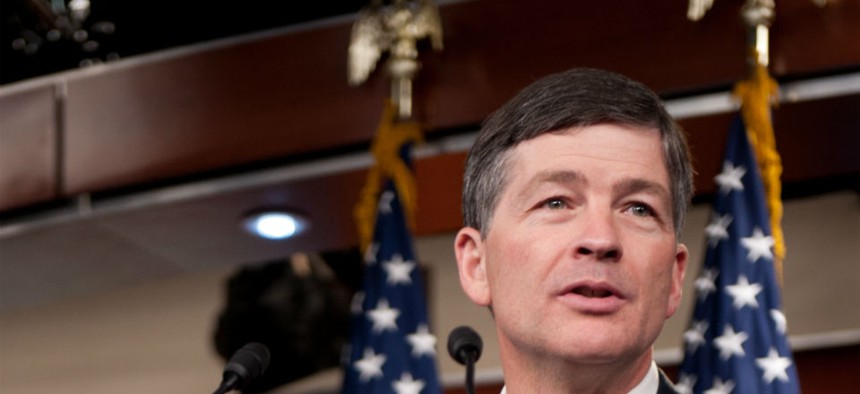
Rep. Jeb Hensarling, R-Texas, is opposed to any reauthorization of the Export-Import Bank. Flickr user House GOP
Why 400 Feds Could Be Out of a Job
The very existence of a small federal agency hangs in the balance as Congress returns from summer recess.
Congress has a lot on its plate when it comes back to work next week.
First and foremost, of course, is passing a spending measure to keep the government from once again shutting down in October. Most parties seem to agree the best course of action is to pass a short-term continuing resolution, allowing any major funding battles to take place after the November midterm elections.
Also on the agenda, however, is an existential crisis for a small, independent agency that in the course of a few months has gone from the shadows of Washington, D.C., insider jargon to the epicenter of the national political conversation: the Export-Import Bank.
The agency offers loans to foreign companies buying American products. Its charter is set to expire Sept. 30, the same day funding for all of government runs dry.
For the last few months, lawmakers -- mostly Democrats -- have been clamoring for a reauthorization bill, but some, mostly conservative Republicans are reluctant to support an agency they say is a shill for crony capitalism and corporate welfare.
So where does that leave the Export-Import Bank and its 423, mostly General Schedule employees? Bank officials say even without a deal to extend the agency’s charter, it will not have to shutter its doors and send its employees home on Oct. 1.
Instead, the officials said, the Bank would not be authorized for any new transactions. It would still be obligated to carry out existing transactions, which, with or without an Export-Import Bank authorization, would be backed by the full faith and credit of the United States.
The agency, therefore, would still need its employees to collect funds, process claims and make payments until its portfolio reaches maturity.
Still, the long-term future of the agency and its workforce remain in jeopardy. Republican leadership in the House has pushed a deal to temporarily reauthorize the Bank while lawmakers come up with a permanent plan, which could include phasing out the agency entirely. Such a deal is far from complete, however, thanks in large part to House Financial Services Committee Chairman Jeb Hensarling, R-Texas. Hensarling is opposed to any reauthorization.
“We need to level the playing field so American manufacturers and small businesses can compete, but Ex-Im doesn’t level the playing field,” Hensarling said in a statement. “Washington shouldn’t pick winners and losers, and hardworking American taxpayers -- who are already under tremendous stress -- shouldn’t be forced to pay for foreign corporate welfare that advantages a handful of powerful, politically-connected corporations.”
If congressional negotiators are unable to reach a deal, House leadership could attach a reauthorization provision onto the short-term spending bill. Few lawmakers want to relive the damaging effects and press that resulted from last year’s shutdown -- especially just weeks before an election -- making the bill’s passage likely.
Whichever path it chooses, Congress has just a few weeks to reach an agreement before it once again recesses until after the elections. As House Speaker John Boehner, R-Ohio, recently told reporters, September promises to be “brief, but busy.”
(Image via Flickr user House GOP)
NEXT STORY: High Performance Is Not a Secret







